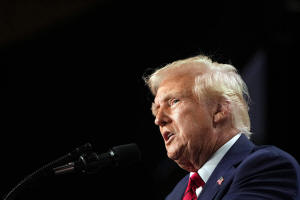Firings, freezes and layoffs: A look at Trump's moves against federal
employees and programs
 Send a link to a friend
Send a link to a friend
 [January 29, 2025]
By MEG KINNARD [January 29, 2025]
By MEG KINNARD
CHAPIN, S.C. (AP) — Changeover among federal government agencies is
normal when a new administration comes to Washington, with presidents
regularly dismissing appointees selected by predecessors from opposing
political parties. But President Donald Trump has implemented sweeping
changes in the first days of his second administration, from firing
career agency employees to freezing trillions in federal grant funds and
halting diversity, equity and inclusion programs that could result in
wide-ranging layoffs.
At least 240 employees are known to have been fired, reassigned, or
designated to be laid off. Thousands of employees could be affected by
other moves, such as a federal employee buyout offer, or the grant funds
pause.
Here's a comprehensive look at Trump's actions so far:
Federal employee buyouts
On Tuesday, the White House abruptly began offering buyouts to all
federal employees who opt to leave their jobs by next week, according to
a memo from the Office of Personnel Management, the government’s human
resources agency.
The memo, which noted that employees who leave their posts voluntarily
will receive about seven months of salary — but must chose to do so by
Feb. 6 — listed four directives it said Trump is mandating for the
federal workforce, including that most workers return to their offices
full-time.
The potential large-scale reduction in the federal workforce could have
wide-ranging — and as yet unknowable — implications for impacting the
delivery, timeliness and effectiveness of federal services across the
nation.

The federal government employs more than 3 million people, which makes
it roughly the 15th largest workforce in the nation. The average tenure
for a federal employee is 11.8 years, according to an analysis by the
Pew Research Center of data from the Office of Personnel Management.
Equal Employment Opportunity Commission
The federal agency that enforces laws against workplace discrimination,
the EEOC describes itself as a bipartisan commission comprised of five
members, all appointed by presidents. On Tuesday, a law firm posted on
social media that it was representing Charlotte Burrows, a commissioner
who had been fired on Monday by the Trump administration.
In a statement issued through the firm, Burrows said that she had been
appointed in 2015, serving under Democratic Presidents Barack Obama and
Joe Biden, as well as during Trump’s first term. According to Burrows,
her third term was set to expire in July 2028.
Burrows also noted that Jocelyn Samuels, another commission member
appointed by a Democratic president — Biden — had also been fired as
Trump took office, saying their removals were “unprecedented and will
undermine the efforts of this independent agency to do the important
work of protecting employees from discrimination, supporting employers’
compliance efforts, and expanding public awareness and understanding of
federal employment laws.”
Inspectors general
Each of the federal government's largest agencies has its own inspector
general who is supposed to conduct objective audits, prevent fraud and
promote efficiency.
Trump has fired at least 17 of them across the federal government,
including inspectors he appointed in his first term. At least one
Democratic appointee — Michael Horowitz, appointed to the post at the
Justice Department by Obama — was spared.
Trump confirmed the move in a conversation with reporters aboard Air
Force One on Saturday, claiming, “it’s a very common thing to do,” and
saying that he would “put good people in there that will be very good.”
Senate Democratic Leader Chuck Schumer called the firings a “chilling
purge,” while GOP Sen. Lindsey Graham, a top Trump ally, acknowledged
that the firings may have violated the law but said: “Just tell them you
need to follow the law next time."

Federal prosecutors
It's normal for politically appointed U.S. attorneys to be replaced, but
not as standard for career prosecutors to be ousted.
The Justice Department said Monday that it had fired more than a dozen
employees who worked on criminal prosecutions of Trump, abrupt
terminations targeting career prosecutors who worked on special counsel
Jack Smith’s team investigating Trump. The firings were effective
immediately.
By tradition, career employees remain with the department across
presidential administrations regardless of their involvement in
sensitive investigations.
Multiple senior career officials were also reassigned.
It was not immediately clear which prosecutors were affected by the
order, or how many who worked on the investigations into Trump remained
with the department as Trump took office last week. It was also not
immediately known how many of the fired prosecutors intended to
challenge the terminations by arguing that the department had cast aside
civil service protections afforded to federal employees.
National Security Council
The National Security Council provides national security and foreign
policy advice to the president. Last week, 160 of its career government,
nonpolitical employees were sent home while the administration reviews
staffing in an attempt to align with Trump's priorities.
The employees, commonly referred to as detailees, were summoned for an
all-staff call and told they would be expected to be available to the
council’s senior directors but would not need to report to the White
House.
[to top of second column]
|

President Donald Trump speaks at the 2025 House Republican Members
Conference Dinner at Trump National Doral Miami in Doral, Fla.,
Monday, Jan. 27, 2025. (AP Photo/Mark Schiefelbein)

Incoming national security adviser Mike Waltz had signaled before
Inauguration Day that he would look to return holdover civil servants
who worked in the council during Biden’s administration to their home
agencies. That was meant to ensure the council is staffed by those who
support Trump’s goals.
State Department
A large number of senior career diplomats who served in politically
appointed leadership positions — as well as in lower-level posts at the
State Department — left their jobs at the demand of the new
administration.
It was not immediately clear how many non-political appointees were
being asked to leave.
Foreign aid and development
In his first week in office, Trump issued an executive order directing a
90-day pause on most U.S. foreign assistance disbursed through the State
Department. That mean thousands of U.S.-funded humanitarian, development
and security programs worldwide stopped work or were preparing to do so;
without funds to pay staff, aid organizations were laying off hundreds
of employees.
A week into the new administration, at least 56 senior officials in the
top U.S. aid and development agency were placed on leave amid an
investigation into an alleged effort to thwart Trump’s move. Speaking on
condition of anonymity for fear of reprisal, a current official and a
former official at the U.S. Agency for International Development
confirmed to The Associated Press the reason given for the move and also
said that several hundred contractors based in Washington and elsewhere
were laid off.
An internal USAID notice sent late Monday and obtained by AP said new
acting administrator Jason Gray had identified “several actions within
USAID that appear to be designed to circumvent the President’s Executive
Orders and the mandate from the American people.”
Secretary of State Marco Rubio has specifically exempted only emergency
food programs and military aid to Israel and Egypt from the freeze on
foreign assistance.
Diversity, equity and inclusion
On his second day back at the White House, Trump moved to end
affirmative action in federal contracting and directed that all federal
diversity, equity and inclusion staff be put on paid leave and
eventually be laid off.
That move followed an executive order Trump signed on his first day
ordering a dismantling of the federal government’s diversity and
inclusion programs that could touch on everything from anti-bias
training to funding for minority farmers and homeowners, programs Trump
has called “discrimination.”

That action revokes an order issued by President Lyndon Johnson, and
curtails DEI programs by federal contractors and grant recipients. It’s
using one of the key tools utilized by the Biden administration to
promote DEI programs across the private sector — pushing their use by
federal contractors — to now eradicate them.
While many changes may take months or even years to implement, prominent
companies from Walmart to Facebook have already scaled back or ended
some of their diversity practices in response to Trump’s election and
conservative-backed lawsuits against them.
By Friday, federal agencies are expected to develop a plan to execute a
“reduction-in-force action” against federal DEI workers in their employ
as of Election Day.
Federal grants and loans
The White House said Tuesday it was pausing federal grants and loans as
Trump's administration begins an across-the-board ideological review.
The funding freeze by the Republican administration could affect
trillions of dollars and cause widespread disruption in health care
research, education programs and other initiatives. Even grants that
have been awarded but not spent are supposed to be halted.
“The use of Federal resources to advance Marxist equity, transgenderism,
and green new deal social engineering policies is a waste of taxpayer
dollars that does not improve the day-to-day lives of those we serve,”
said a memo from Matthew Vaeth, the acting director of the Office of
Management and Budget.
Democrats and independent organizations swiftly criticized the
administration, describing its actions as capricious and illegal because
Congress had already authorized the funding.
National Labor Relations Board
A federal agency, the National Labor Relations Board is tasked with
preventing unfair labor practices by employers and unions, and
protecting the rights of private sector employees. On Tuesday, Trump
fired its acting chair, Gwynne Wilcox, the first Black woman to serve as
an NLRB member, according to Josh Boxerman, of the National Employment
Law Project.

Wilcox's term as a board member was set to run through August 2028.
According to national labor law, board members can only be fired for
neglect of duty or malfeasance.
In a statement to Bloomberg, which first reported her firing, Wilcox
said she believed her removal violates “long-standing Supreme Court
precedent" and that she would “be pursuing all legal avenues to
challenge” it.
___
Ellen Knickmeyer, Matthew Lee, Aamer Madhani and Zeke Miller contributed
to this report.
All contents © copyright 2025 Associated Press. All rights reserved |